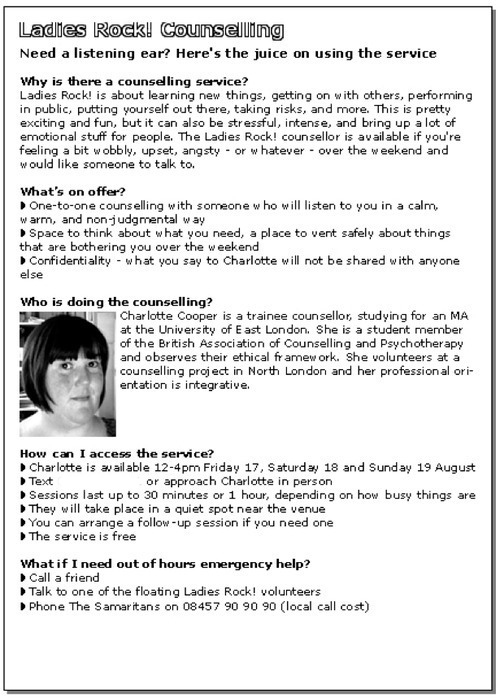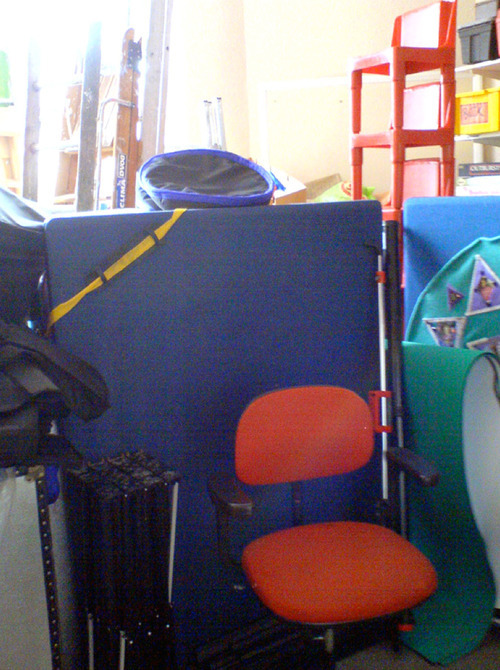In 2007 I was halfway through my training as a counsellor/psychotherapist at the University of East London. I volunteered at East London Out Project, an LGBT community and counselling project, and working as a freelance. I was pretty involved in queer feminist DIY things, and had been for ages. My therapy and social worlds were disconnected; Ladies Rock presented an opportunity for integration.
Camp Counsellor
Apart from the DIY angle, I understood Ladies Rock to be rooted in a model of youth education that emerged from the US. It was an environment that was familiar to me through progressive educators from the States that I knew growing up, and in popular culture. I understood that the figure of the Camp Counsellor was part of this kind of a scene, even though it’s fairly foreign to many people in the UK (or at least more likely to be medicalised through psychiatry and psychology, using a paradigm of mental health and pathology rather than wellbeing or community). Ladies Rock was a bit of an experiment, a pilot for something else perhaps, and I wondered if there was a place for me in it, not as a tutor, student, musician or organiser, but as a therapist.
I wanted to develop my counselling skills and also to serve the community. Therapy is not always accessible, it can be expensive, there are long waiting lists, as well as rules and codes that are baffling to regular people. This was especially so for the people who would be coming to Ladies Rock.
I also thought that the event could do with some support. Organising and managing an event of this scale is stressful; there is next to no money and people work for the love of it. There are usually no structures in place for when things go wrong, and people can get very burned out quickly. Friendships and productive working relationships can go awry in this pressure cooker environment. At Ladies Rock, people might find that learning and performing left them feeling vulnerable or discombobulated.
A confidential listening space could be really helpful, somewhere people could vent, talk about how they were doing or cope with a crisis. I proposed something like this and Ladies Rock said: “Yeah!”
DIY Therapy
Therapist work is not just about active listening skills. It’s also about creating an ethical structure that keeps people as safe as possible. I had to create a service that was open to anyone and protected their confidentiality. I made and distributed a little flyer and introduced myself to everyone.

A quiet little store room with a couple of chairs was reserved for me for most of the weekend. I called this The Courtney Love Counselling Room, a reference to the indie icon’s mental health that was both ironic and sincere. This meant that people could come and talk without being overheard by anyone else. At other times I used an office. This was much more exposed and there were interruptions.

People booked in with me via text or in person for a 30 minute session which could be extended if necessary. They could also see me more than once. I explained the limits of my service: I could listen but would break confidentiality if people were in danger. If I couldn’t help people I would refer on. I was a counsellor at Ladies’ Rock, but that that role stopped when the event ended.
It’s hard to remember how many people used my therapy service over the weekend. More of the organisers came than campers. There was a steady stream of people who needed a space to talk and be heard. Themes included: difficulties in relating to people, money worries, exhaustion, body issues, performance anxiety. I was secretly pleased about this, not because people were getting stressed, but that my hunch about self-care and emotional support at a DIY event was well-founded.
Evaluating the project
People who came said they found the service useful and were amazed that there was a counsellor there at all. I felt a lot of warmth and got some lovely anonymous shout outs on the Shout Out Wall. Some people wanted to pay, but I declined because it was important to me that the service was free. Other people had never had therapy before and wanted to see what it was like. I loved introducing people to therapy and their willingness to have a go.
Some of the difficulties were about how I worked with confidential material in a community I’m part of. There are, rightly, professional concerns about taking on dual roles, and I had to be careful about this. I was freaked out when someone said: “Charlotte knows all our secrets,” for example. Well, yeah, but I would never share them. Because of this, I didn’t really participate much in the rest of the weekend. I usually work with a supervisor but here I didn’t because I didn’t know anyone suitable. They would need to be familiar with the scene and open to working experimentally. If I ever did this again I would ensure that I had good supervision in place.
Overall, though, I thought it was a really good experience. I often feel that there is a lack of creativity in counselling culture that can be stultifying. Ladies Rock gave me a chance to challenge this. I produced a free experimental service that was appreciated, dynamic, adapted to people’s needs, culturally specific, undertaken with professional boundaries. It was also rock’n’roll! I helped put self-care and mental health on the agenda for future events. People were glad of the service, including those who didn’t use it, because it showed that their well-being mattered. It was fun to be part of the weekend, also validating to find that it’s not just me who finds big events overwhelming.
Now
I’m writing this six years later. I have a PhD, a lot more DIY experience and have my own psychotherapy practice. Whilst some things have changed, my commitment to accessible therapy persists. I am interested in bringing therapy to community events and experimenting with its form. In the spring I worked as in-house therapist for Hamburger Queen, for example.
There is space for more formal organisations and event producers to have an in-house therapist available. This needn’t be expensive, and would pay for itself in terms of keeping people well and emotionally supported. Please get in touch if you would like to work with me on such a project.